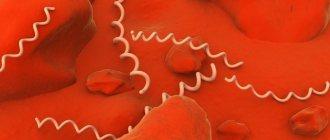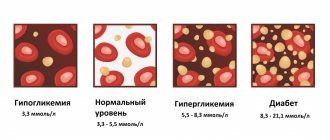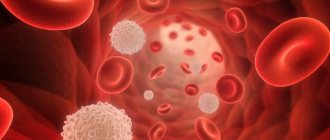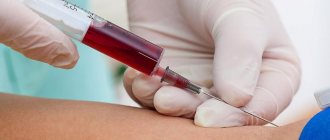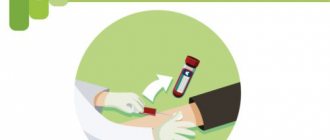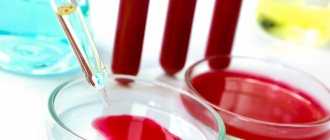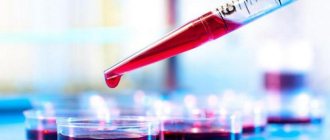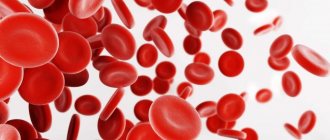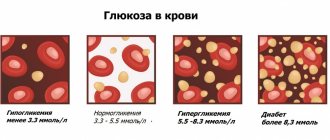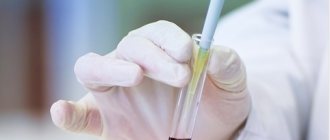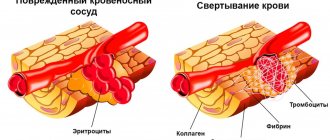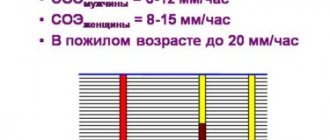- September 10, 2019
- Child's health
- Karina Perevalova
A general (or clinical) blood test is the most frequently prescribed laboratory test, during which it is possible to determine whether any pathological process is occurring in the body of a child or adult. In addition, it can be used to control the course of chronic ailments.
Clinical examination of liquid connective tissue is both a nonspecific and universal test. This is due to the fact that its results can be correctly interpreted only taking into account the patient’s symptoms.
Both infants and older children are faced with the need to regularly submit biological material for research. Below we describe how to correctly take a general blood test for a child, and what nuances need to be taken into account when preparing for the test. In addition, information is provided on how to correctly interpret the study results.
Indications
A clinical blood test is the most common type of laboratory diagnosis, based on the results of which conclusions can be drawn about the general condition of a person. In pediatrics, this test is especially important, because parents cannot always determine what really hurts their children.
Examination of just a few milliliters of liquid connective tissue can confirm or exclude the presence of a pathological process in the child’s body. Repeated analysis allows you to assess the degree of effectiveness of the treatment carried out earlier.
There are many conditions for which a clinical blood test is suspected to be particularly valuable. These include:
- Infectious pathologies of an inflammatory nature. They can have different etiologies (bacterial, viral, fungal) and localization. Most often, a general blood test is performed in children if they have symptoms of respiratory, skin and intestinal diseases, in particular helminthiasis.
- Inflammatory pathologies of non-infectious etiology. These include allergic and autoimmune diseases.
- Anemia.
- Blood loss resulting from injury.
- Impaired coagulation of liquid connective tissue.
- Pathologies of a malignant nature, which can be either congenital or acquired.
In addition, a general blood test is prescribed to assess the effectiveness of the treatment and before admission to educational institutions (kindergartens, schools).
BLOOD TESTS FOR INFECTIONS
1-2 days before the test, exclude high-fat foods from your diet. 2 days before donating blood for viral hepatitis, exclude citrus fruits, orange fruits and vegetables from the diet. The results of tests for the presence of infections depend on the period of infection and the state of the immune system, so a negative result does not completely rule out infection. At an early stage of the disease, seroconversion occurs (absence of antibodies during the acute period of the disease). In doubtful cases, it is advisable to re-test after 3-5 days. A blood test for the presence of IgM to infectious agents should be carried out no earlier than 5-7 days from the moment of illness, and IgG and IgA no earlier than 10-14 days. This is due to the timing of the production of antibodies by the immune system and their appearance in the blood in the diagnostic titer.
Contraindications
If your child visits a massage therapist, it is necessary to complete the course or reschedule the date of collection of biological material. In addition, it is unacceptable to donate blood immediately after an X-ray examination, ultrasound or any physiotherapeutic procedures.
There are no absolute contraindications to the analysis. However, if a child suffers from certain diseases, in particular blood clotting disorders, low blood pressure, difficulties may arise during the collection of biomaterial. The nurse must be warned about this in advance.
General rules
- For most studies, it is recommended to donate blood in the morning, from 8 to 11 o’clock, on an empty stomach (at least 8 hours must pass between the last meal and blood collection, you can drink water as usual), and on the eve of the study, have a light dinner with limited intake of fatty foods. For tests for infections and emergency studies, it is acceptable to donate blood 4-6 hours after the last meal. If you are taking medications, be sure to notify your doctor.
- Donate blood for gastrin-17, lipid profile (total cholesterol, HDL cholesterol, LDL cholesterol, VLDL cholesterol, triglycerides, lipoprotein (a), apolipoprotein A1, apolipoprotein B) and glucose tolerance test should be strictly on an empty stomach, after 12-14 hours hunger.
- 24 hours before the test, you must avoid alcohol, intense physical activity, and taking medications (in consultation with your doctor).
- 1-2 hours before the test, you must refrain from smoking, do not drink juice, tea and coffee, and you can drink still water. Avoid physical stress (running, quickly climbing stairs), emotional excitement. It is recommended to rest and calm down 15 minutes before donating blood.
- You should not donate blood for laboratory testing immediately after physiotherapeutic procedures, instrumental examination, X-ray and ultrasound examinations, massage and other medical procedures.
- When monitoring laboratory parameters over time, it is recommended to conduct repeated tests under the same conditions - in the same laboratory, donate blood at the same time of day, etc.
- Blood for research must be donated before starting to take medications or no earlier than 10-14 days after stopping them. To assess the control of the effectiveness of treatment with any drugs, a study should be conducted 7-14 days after the last dose of the drug.
Preparation rules
This stage is very important. Parents should be responsible for preparing for the study. If you do not take into account some nuances before collecting biomaterial, the interpretation of a general blood test in children may subsequently be carried out incorrectly. It is important to understand that liquid connective tissue reacts very sensitively to any changes.
Basic rules of preparation:
- Stop taking medications 14 days in advance. For example, if the child was treated for a completely different reason. If canceling the appointment is impossible, you must inform the doctor about this. The doctor will take this information into account when interpreting the results of the child’s general blood test.
- The day before and on the day of delivery of the biomaterial, it is necessary to avoid physical activity. It is recommended to take your baby for a walk before bedtime, and then put him to bed. For older children, you can read a book the day before, get a massage, or play calm games.
- If the blood sugar concentration is important to the doctor, you should not brush your child’s teeth in the morning. Older children should be prohibited from using chewing gum.
- After waking up, it is recommended to drink a glass of clean water without carbon. Information regarding whether to take a general blood test for a child on an empty stomach or not is presented below.
The psychological aspect plays a very important role. It is extremely important to prepare the child for the blood sampling process itself. If the child is older than 1 year, you can already try to explain to him that everything will go quickly and painlessly.
Clinical examination of liquid connective tissue is a highly sensitive indicator that allows you to detect even the slightest malfunction in the functioning of internal organs. At the same time, ignoring the need to comply with preparation rules can lead to false results.
Preparing for a blood test
General rules when preparing for blood tests (clinical, biochemical, enzyme immunoassay blood tests)
The study is carried out in the morning on an empty stomach - at least 8 to 12 hours must pass between the last meal and blood drawing. In the evening of the previous day, a light dinner is recommended. It is advisable to exclude fatty, fried foods and alcohol from the diet 1–2 days before the examination. If there was a feast the day before or a visit to the bathhouse or sauna, it is necessary to reschedule the laboratory test for 1 - 2 days.
You must refrain from smoking 1 hour before taking blood.
You should not donate blood after X-ray examinations or physiotherapeutic procedures.
It is necessary to exclude factors that influence the research results: physical stress (running, climbing stairs), emotional arousal. Before the procedure, you should rest for 10–15 minutes and calm down.
It must be remembered that the result of the study may be distorted by the effect of the medications taken or the products of their metabolism. Prescription and discontinuation of any drug is accompanied by changes in laboratory parameters. Therefore, before taking the test, you should consult your doctor about the possibility of limiting your medications to prepare for the test. It is recommended to stop taking medications before donating blood for testing, that is, blood is drawn before taking medications.
Taking into account the daily rhythms of changes in blood parameters, it is advisable to carry out repeated studies at the same time.
Different laboratories may use different research methods and units of measurement. In order for the assessment of the examination results to be correct and the results to be acceptable, it is advisable to conduct research in the same laboratory at the same time.
Taking water does not affect blood counts, so you can drink water.
General rules apply to all tests, but some tests require special preparation and additional restrictions.
It is very important to strictly follow the recommendations below, since only in this case will reliable research results be obtained.
Features of preparation
to individual laboratory tests
Clinical blood test
Proper preparation for a clinical blood test:
- blood is donated in the morning on an empty stomach, 4-5 hours after the last meal)
- 1-2 days before the test, exclude high-fat foods from your diet.
Study of cholesterol and lipid spectrum
To determine cholesterol and lipid spectrum, blood is taken strictly after a 12-14 hour fast. It is necessary to discontinue drugs that lower blood lipid levels within 2 weeks, unless the goal is to determine the lipid-lowering effect of therapy with these drugs.
Urea
1-2 days before the study, you must follow a diet: stop eating foods rich in purines - liver, kidneys, and also limit meat, fish, coffee, tea in your diet as much as possible. Intense physical activity is contraindicated.
Uric acid
It is necessary to follow a diet in the days preceding the study - refuse to eat foods rich in purines: liver, kidneys, limit meat, fish, coffee, tea as much as possible in the diet. Intense physical activity is contraindicated. It is necessary to discontinue medications such as caffeine, theobromine, theophylline, salicylates, ascorbic acid, antibiotics, sulfonamides, thiazole derivatives.
Alpha-2-macroglobulin
You must abstain from meat for three days before the test.
Anti-Mullerian hormone
Inhibin B
For women, the study is carried out on days 3-5 of the menstrual cycle. 3 days before taking blood, avoid intense sports training. The study should not be performed during any acute illness. Do not smoke 1 hour before taking blood.
ACTH
Cortisol
On the eve of the study, avoid taking medications such as glucocorticoids, estrogens, oral contraceptives. It is also necessary to avoid drinking alcohol, exercising, and smoking. Due to the fact that ACTH and cortisol are stress hormones, you need to calm down and relax for 20 minutes before donating blood. Any stress causes an unmotivated release of these hormones into the blood, which will lead to an increase in this indicator. The level of these hormones changes cyclically throughout the day, so the most informative results are studies conducted no later than 2 hours after sleep and before 10 am.
Bilirubin
It is not recommended to take ascorbic acid, medications or products that cause artificial coloration of the serum the day before.
Sex hormones
Tests for sex hormones in women are carried out only on the appropriate days of the menstrual cycle of a particular patient, as indicated by the doctor.
In women of reproductive age, the results of hormonal studies are influenced by physiological factors associated with the phase of the menstrual cycle. When examining sex hormones, indicate the phase of the menstrual cycle.
Hormones of the reproductive system must be taken strictly on the days of the cycle:
LH, FSH - 3-5 days of the cycle;
Estradiol - 5-7 or 21-23 days of the cycle;
Progesterone - days 21-23 of the cycle;
17-OH-progesterone - 7-9 days;
DHA - sulfate, testosterone - 7-9 days.
Prostate-specific antigen (PSA)
Blood sampling should be performed before palpation examination and massage of the prostate gland (PG), laser therapy, radiography, cystoscopy, colonoscopy. These therapeutic and diagnostic measures can cause a more or less pronounced and prolonged rise in PSA levels in the blood. Since the extent of such changes is unpredictable, blood sampling must be carried out either before or a week after the manipulations.
Prolactin
Blood is drawn in the morning, no earlier than 3 hours after waking up. Considering that prolactin levels can increase as a result of physical or emotional stress, after sexual intercourse, after staying in a sauna, or drinking alcohol, it is necessary to exclude these factors before the study. Before the examination, exclude palpation of the mammary glands and ultrasound examination of the mammary glands.
Diagnosis of infectious diseases
(including urogenital infections)
Blood sampling for diagnostics is carried out before the start of taking antibacterial and chemotherapy drugs or no earlier than 10–14 days after their discontinuation. When performing tests for the presence of infections, it should be taken into account that, depending on the period of infection and the state of the immune system, any patient may have a false negative result. But, nevertheless, a negative result does not completely exclude the presence of infection and in doubtful cases it is necessary to re-test.
Immunogram
A blood test is taken strictly on an empty stomach, after a 12-hour fast and always before starting to take antibacterial, anti-inflammatory and hormonal drugs or no earlier than 2 weeks after their discontinuation. If on the eve of the test there was a rise in temperature, any acute or exacerbation of a chronic disease, then it is better to reschedule the test.
Allergy research
(Immunoglobulin E, Allergens)
Basic rules for preparing for an allergy test:
● Stop drinking alcohol, dietary supplements, vitamins, aspirin, and medications (except for vital ones; must be agreed with your doctor) at least two days in advance.
● It is not recommended to conduct studies during immunosuppressive therapy (cytostatics, glucocorticoids, radiation therapy, chemotherapy) due to inhibition of immunoglobulin synthesis.
● To exclude false negative results, it is necessary to refrain from taking anti-allergy medications 5 - 7 days before taking a blood test.
● Blood is donated on an empty stomach. In the morning you should not drink coffee, tea, or juices.
Contraindications for the study are:
● menstrual cycle (you can take the test 3 days before or 5 days after menstruation);
● acute phase of any infection (ARVI, influenza, fever and others);
● taking antibiotics (7-10 days after discontinuation).
Thyroid hormone test
2 - 3 days before the study, do not take iodine-containing drugs, 1 month - thyroid hormones (to get true basal levels), unless there are special instructions from the endocrinologist. However, if the purpose of the study is to control the dose of thyroid hormone drugs, blood is drawn while taking the usual dose. It should be borne in mind that taking levothyroxine causes a transient, significantly increased level of total and free thyroxine in the blood for approximately 9 hours (by 15–20%).
Thyroglobulin
It is advisable to conduct the study at least 6 weeks after thyroidectomy or treatment. If diagnostic procedures such as a biopsy or thyroid scan are prescribed, then a study of TG levels in the blood must be strictly carried out before the procedures.
Creatinine
Eating a large amount of protein in the days leading up to the blood draw can lead to an increase in creatinine levels in the blood. Blood creatinine levels may increase due to intense physical activity.
Serum iron
Blood sampling should be done before starting to take iron-containing nutritional supplements and medications or no earlier than 2 weeks after the end of use.
Bleeding time
It is necessary to stop taking aspirin and other antiplatelet drugs 5-7 days before the examination, as they prolong bleeding time.
Hemostasis system
(APTT, D-dimer, coagulogram, lupus anticoagulant,
prothrombin index, thrombin time, fibrinogen)
It is necessary to stop taking hormones, heparin, contraceptives, aspirin, antiplatelet agents 5-7 days before the examination.
SA-15-3
Blood sampling should be done before or no earlier than 2 weeks after biopsy, surgery and breast massage.
SA-125
In order to exclude the possibility of false-positive results in women of childbearing age, blood sampling should be carried out in the first phase of the menstrual cycle (7th – 8th day).
UBC (bladder cancer antigen)
Urine collection should be carried out before or 10 days after invasive procedures, as well as before the start of specific treatment. The morning portion of urine is collected, and if this is not possible, then urine that has been in the bladder for at least 3 hours is collected.
Cholesterol and lipid spectrum
To determine cholesterol and lipid spectrum, blood is taken strictly after a 12-14 hour fast (after eating a fatty meal, the level of triglycerides increases significantly and remains high for several hours
Before blood is drawn, the patient must maintain his normal diet for 2 weeks.
Avoid alcohol intake for three days (the presence of alcohol in the blood is a common cause of hypertriglyceridemia, even in fasting patients).
It is necessary to discontinue drugs that lower blood lipid levels within 2 weeks, unless the goal is to determine the lipid-lowering effect of therapy with these drugs.
Calcium
For 3 days, avoid taking medications containing calcium.
Prenatal screening
It is carried out within strictly defined periods of pregnancy. Outside of these periods, the diagnostic significance of these indicators is low.
Gastrin
H. Pylori IgG
One day before taking blood, it is necessary to avoid drinking alcohol and coffee, and 1 hour before taking blood - smoking. It is better to donate blood in the morning, after an overnight period of fasting. The study is carried out on an empty stomach (12 hours after the last meal),
Before the study, the patient should not take medications that affect gastric secretion:
One week before the study, cancel: Atropine, Metacin, Platyfillin, Gastrocepin, Pepsidin, Ranitidine (Zantac, Ranisan), Omez (omeprazole), Gastrozole, famotidine (quamatel, ulfamid), Lansoprazole, Rabeprazole (Pariet), Esomeprazole (Nexium).
2-3 days before the study, stop medications that neutralize hydrochloric acid: Gaviscon, Phospholugel, Almagel, Gastal, Maalox, Megalac and others.
The patient should discuss the possibility of stopping these medications with their healthcare provider in advance.
It is optimal to study gastrin levels before starting drug treatment or after its completion.
Take tests constantly in the same laboratory - and your doctor will approximately know your personal normal values and any deviation from the norm will be immediately noticed by him.
Home visit Addresses of medical offices Frequently asked questions Personal data processing policy
Features of infant nutrition before biomaterial collection
Many parents are concerned about the question of whether to take a general blood test for their child on an empty stomach or not. Doctors say that at the time the biomaterial is taken, the baby’s stomach should be empty.
As a rule, laboratories are open from early morning until 10-11 o’clock. In fact, this gap is quite enough to plan a visit to a medical facility.
As a rule, immediately after waking up, infants feel hungry. If a child wants to eat, there is no need to deny him this and quickly take him to the laboratory. In this case, the baby will experience enormous stress, and the doctor may receive unreliable test results.
If a child is under 1 year old, it is useless to explain to him why he was not fed before a procedure that was scary for him. Breakfast for infants is required. Porridge, milk, lean meat, vegetables - any dish from his usual diet can be offered to the baby. Then you need to take a three-hour break.
Doctors recommend that parents adhere to the following algorithm:
- Wake up your baby early.
- Feed him. Before a general blood test, the child can eat any food that is familiar to him.
- Go for a walk with your child or play at home.
- After 3 hours, go to the laboratory and submit the biomaterial for research.
Thus, before a general blood test, the child can eat. But after finishing the meal, you must wait 3 hours and only then go to the laboratory.
You can drink clean water in moderate portions. All liquids containing sugar, dyes and preservatives are prohibited. It is unacceptable to drink tea, fruit drinks, compotes and decoctions.
HORMONES
Blood for hormonal studies must be donated on an empty stomach in the morning. If this is not possible, blood can be donated for some hormones 4-5 hours after the last meal in the daytime/evening hours (except for those studies for which blood must be donated strictly in the morning). 1-2 days before the test, exclude high-fat foods from the diet; the last meal should not be large. 1 day before the study, psycho-emotional and physical comfort (calm state without overheating and hypothermia) is necessary.
Thyroid hormones
During the initial check of thyroid hormone levels, discontinue medications that affect thyroid function 2-4 weeks before the test (after consultation with your doctor). When monitoring treatment, exclude taking medications on the day of the study and be sure to note this on the referral form (also note information about taking other medications - aspirin, tranquilizers, corticosteroids, oral contraceptives).
Sex hormones
In women of reproductive age, the results of hormonal studies are influenced by physiological factors associated with the phase of the menstrual cycle. When examining sex hormones, indicate the phase of the menstrual cycle.
Hormones of the reproductive system must be taken strictly on the days of the cycle:
LH, FSH – 3-5 days of the cycle; Estradiol – 5-7 or 21-23 days of the cycle; Progesterone – 21-23 days of the cycle; 17-OH-progesterone , DGA-sulfate, testosterone – 7-9 days; Prolactin - donate blood in the morning at rest; before the study, exclude palpation of the mammary glands.
Anti-Mullerian hormone (AMH/MIS), Inhibin B
For women, the study is carried out on days 3-5 of the menstrual cycle. 3 days before taking blood, avoid intense sports training. The study should not be performed during any acute illness. Do not smoke 1 hour before taking blood.
Adrenaline and norepinephrine
8 days before the study, exclude medications: salicylates, β-blockers. 1 day before the test, you must refrain from heavy physical activity, exclude alcohol, coffee, tea, B vitamins, and bananas.
Renin, angiotensin
Before the study, exclude the use of estrogens (1-2 months before), diuretics (3 weeks before), and antihypertensive drugs (one week before). Blood collection should be carried out in a sitting or standing position.
Aldosterone
In consultation with your doctor, 8 days before the study, discontinue antihypertensive drugs, β-blockers, laxatives, corticosteroids, diuretics, and antidepressants. 3 weeks before the study, discontinue aldosterone antagonists.
ACTH, cortisol
Due to the fact that ACTH and cortisol are stress hormones, you need to calm down and relax for 20 minutes before donating blood. Any stress causes an unmotivated release of these hormones into the blood, which will lead to an increase in this indicator. The level of these hormones changes cyclically throughout the day, so the most informative results are studies conducted in the morning before 9 o’clock.
Insulin, C-peptide
Donate blood strictly in the morning.
Gatrin 17, Gastrin-17 stimulated, pepsinogen I, pepsinogen II, H. Pylori IgG
Blood must be donated for testing on an empty stomach after a 12-hour fast. 1 week before the study, refrain from taking medications that affect gastric secretion: Pepcedin, Zantac, Nizax, Ranimex, Esofex, Losec, Somac, Ranixal, Ranil. 1 day before the study, refrain from taking medications that neutralize hydrochloric acid secreted by the stomach: Alsucral, Balancid, Prepulsid, Metropam, Librax, Gaviscon. If you have difficulty stopping medications, be sure to inform your doctor. 3 hours before donating blood, refrain from smoking.
Nutritional features of children over 1 year old
In this case, the child will have to undergo a general blood test on an empty stomach. This rule is unbreakable. It applies to children over 1 year of age and adults. The fact is that the doctor needs to obtain indicators that reflect the actual functioning of the internal organs.
Eating any food before collecting biomaterial will affect the results of the analysis. Due to this, the doctor may interpret them incorrectly. The worst thing is that, due to parental negligence, the doctor may make an incorrect diagnosis and prescribe an inappropriate treatment regimen.
For example, a child had breakfast in the morning and went to the laboratory. About an hour later he donated blood. At this time, food components have already entered the liquid connective tissue and provoked changes in its composition. They affected blood viscosity, the ratio of proteins, fats and carbohydrates, and the leukocyte formula. After the study is completed, the conclusion form will be sent to the attending physician. The doctor will see certain signs and conclude that an inflammatory process is occurring in the child’s body. Then the doctor will prescribe treatment. Therapy can pose a danger not only to health, but also to life. That is why it is extremely important for parents to know how to properly take a general blood test for a child and follow all established preparation rules.
BIOCHEMISTRY
Urea
1-2 days before the study, you must follow a diet: stop eating foods rich in purines - liver, kidneys, and also limit meat, fish, coffee, tea in your diet as much as possible. Intense physical activity is contraindicated.
Cholesterol, lipoproteins
Two weeks before the study, it is necessary to discontinue drugs that lower blood lipid levels, unless the goal is to determine the lipid-lowering effect of therapy with these drugs.
Glucose
When donating blood for glucose (in addition to the basic requirements for preparing for tests), you should not brush your teeth, chew gum, or drink tea/coffee (even unsweetened). A morning cup of coffee will dramatically change your glucose levels. Contraceptives, diuretics and other medications also have an effect.
Glucose tolerance test
It is carried out only if there are preliminary results of determining glucose on an empty stomach, without load. The glucose content in blood plasma is determined on an empty stomach and 2 hours after a glucose load. It is necessary to follow a normal diet (with a carbohydrate content of more than 125-150 g per day) and adhere to the usual physical activity for three days before the study. The study is carried out in the morning on an empty stomach after an overnight fast for 12-16 hours (during this time you should not smoke or drink alcohol). During the study, the patient should lie or sit quietly, not be overcooled and not engage in physical work. It is not recommended to conduct research after and during stress, after operations and childbirth, during inflammatory processes, alcoholic cirrhosis of the liver, hepatitis, during menstruation, and in gastrointestinal diseases with impaired glucose absorption. Before the test, it is necessary to exclude medical procedures and medications (adrenaline, glucocorticoids, contraceptives, caffeine, thiazide diuretics, psychotropic drugs and antidepressants). Discontinuation of medications is carried out only after preliminary consultation of the patient with a doctor.
for CHILDREN UNDER 14 YEARS OLD .
PREGNANT women are recommended to carry out a glucose tolerance test at 24-28 weeks, this allows identifying women with gestational diabetes with an accuracy of 98%.
Process of collecting biomaterial
Many mothers and fathers do not know where they get a general blood test from children. Both capillary and venous blood are suitable for the study. These species have different normal values, which must be taken into account when interpreting the results.
Where do they get a general blood test for children? Most often, by default, biomaterial is collected from a finger. But, according to clinical recommendations, if it is impossible to perform this action, the nurse has the right to make a puncture in the vein. It is worth noting that this happens extremely rarely.
Blood sampling for clinical research occurs as follows:
- The nurse wipes the pad of the finger of the non-working hand with cotton wool, generously moistened with an antiseptic. The latter most often is medical alcohol.
- The nurse then very quickly pierces the skin with a lancet or scarifier. Then she puts a little pressure on the pad of her finger so that a few drops of blood come out. This liquid connective tissue is removed with cotton wool soaked in an antiseptic.
- The nurse then collects the escaping blood and transfers it to a tube. Then cotton wool moistened with an antiseptic is applied to the puncture site. It needs to be held on the pad for several minutes. This is necessary in order to stop the bleeding.
The process of collecting biomaterial lasts on average 1 minute. It is necessary to explain to the child that it is not associated with the occurrence of severe painful sensations, but some discomfort may still occur.
Information on how to take a general blood test for a child can be provided by the doctor who ordered the test. He will subsequently be involved in the interpretation of the results.
Normal indicators
During the diagnosis, the laboratory technician takes into account the total volume of blood, counts the number of formed elements, and also evaluates their relationship with plasma and with each other. That is why decoding the result is difficult for people without medical education. Doctors do not recommend considering your own conclusions to be 100% correct and independently prescribing treatment for your child. This can lead to irreparable consequences.
The age of the child must be taken into account. The fact is that as children grow older, the norms for the results of a general blood test in children also change. Information about what indicators are normal for each age is presented in the table below.
If the child is completely healthy, all of these indicators will be within normal limits. If a pathological process occurs in his body, they will be deviated in one direction or another. It does not happen that only one indicator decreases or increases. That is why a comprehensive assessment of laboratory diagnostic results is important. Only a doctor can do this correctly.
Rules for preparing for laboratory tests in children
Recommendations for drawing blood from children under 14 years of age:
Psychological preparation of a child before donating blood:
- The main requirement for mom is to remain completely calm. Children, especially toddlers, feel their mother’s mood very keenly and also begin to get nervous if she is afraid of the upcoming procedure.
With a child who has already reached preschool or school age, discuss what will happen. You should not scare him, especially if he is donating blood for the first time.
You can also warn that the child will most likely experience discomfort.
- Make sure your child is not bored before the blood is drawn. Take with you a book, his favorite toy, a coloring book with markers - depending on the age of the child. This will not only take up his time, but will also not allow him to concentrate on the fear of the upcoming procedure.
- Decide whether you need to be present in the doctor's office during the test. Of course, it will be needed if the child is very small, but for some schoolchildren, even in the lower grades, the presence of parents can only interfere and provoke tears or protest. Focus on the child's psychological characteristics.
- During the blood collection procedure, small children should be held in your arms. If a child feels the warmth and protection of his mother, he reflexively calms down even in an unfamiliar and frightening environment.
- It is advisable to begin drawing blood not immediately after entering the treatment room. You need to give the baby a couple of minutes to get acquainted with the situation and the stranger who will take him by the hands.
What diseases are indicated by deviations from the norm?
It is worth noting that this does not always happen due to a pathological process. Sometimes the reasons are natural. Or parents forgot how to take a general blood test for their child, and, for example, fed him immediately before visiting the laboratory. Both pathological and physiological causes are described below.
One of the most important indicators is hemoglobin. This substance is an iron-containing protein found in red blood cells. When its concentration in the blood decreases, it is customary to talk about anemia. This is a pathological process characterized by a deficiency of oxygen molecules in the body, as a result of which the functioning of all systems is disrupted.
Reasons for decreased hemoglobin levels:
- Unbalanced diet. Anemia is often diagnosed in children who do not receive proper complementary foods.
- Pathologies of the digestive organs.
- Infectious diseases.
- Helminthic infestations.
- Incompatibility of the blood of the fetus and mother during pregnancy.
- The process of destruction of red blood cells occurs in the body.
- Impaired hemoglobin production.
- Insufficient bone marrow development.
- Congenital pathologies of organs with hematopoietic function.
An increase in hemoglobin levels is diagnosed extremely rarely. The main reasons for this condition:
- Pathologies of the cardiovascular system.
- Impaired kidney function.
- Diseases of liquid connective tissue.
- Pulmonary fibrosis.
- Oncological diseases.
- Pulmonary heart.
- Presence of extensive burns.
- Being in a stressful state (more often detected in schoolchildren).
- Smoking in adolescence.
Red blood cells are the most important formed elements of the basic biological material of humans. Their main purpose is to deliver oxygen molecules to every cell of the body.
When the level of red blood cells increases, it is customary to talk about a condition such as erythrocytosis. The main reasons for its occurrence:
- Congenital heart pathologies.
- Disruption of the hematopoietic system.
- Heart failure.
- Impaired functioning of the adrenal cortex.
- Pathologies of the respiratory system (for example, chronic obstructive pulmonary disease, asthma, bronchitis, etc.).
- Oncological diseases.
- Diabetes.
- Hypertension.
- Any pathology, the course of which is accompanied by vomiting, diarrhea and fever.
- Itsenko-Cushing's disease.
- Splenectomy.
- Extensive burns.
In the presence of erythrocytosis, hemoglobin is always elevated.
If the concentration of red blood cells is reduced, doctors diagnose erythropenia. The causes of this condition may be:
- Bleeding, including chronic bleeding.
- Deficiency of folic acid, iron or vitamins.
- Chronic kidney failure.
- Severe intoxication of the body.
- Radiation or chemotherapy.
- Lymphoma.
- Leukemia.
- Glomerulonephritis.
- Myelodysplastic syndrome.
- Autoimmune pathologies.
- Presence of a tumor in the bone marrow.
- Aplastic type anemia.
- Regular consumption of contaminated water.
- Being under stress.
- Overwork (both mental and physical).
- Hunger.
- Uncontrolled use of medications.
It is worth noting that against the background of erythropenia, the level of hemoglobin always decreases.
The color index is a specific feature. It can be used to judge the ratio of red blood cells and hemoglobin.
If the color index is reduced, this may indicate the following ailments:
- Pathologies of the hematopoietic system.
- Kidney failure.
- Hemoglobinopathies.
- Intoxication of the body with lead or chemicals.
- Anemia.
If there is an increase, the doctor may suspect one of the following pathologies:
- Chronic hypoxia.
- Oncology.
- Diabetes.
- Diseases of the endocrine system.
- Liver damage.
- Anemia.
- Pathologies of the heart or lungs.
Reticulocytes are platelets, but only immature ones. Their number allows you to find out at what speed the composition of liquid connective tissue is renewed.
If reticulocytes are elevated, this may indicate the presence of internal hemorrhage, anemia, malignant damage to the hematopoietic system, hypoxia, inflammatory processes, and infectious diseases. In addition, this condition is often a consequence of an overdose of antipyretics. That is why it is always important to remember how to take a general blood test for children. It is not advisable to take medications before collecting biomaterial.
The concentration of reticulocytes can be reduced due to anemia, thyroid dysfunction, kidney disease, uremia, and infectious processes. In this case, most often there is a significant deviation from the norm. It is better to entrust the interpretation of a child’s general blood test to a doctor. Only a specialist will be able to find out the reason for the deviation.
Platelets are plates that are responsible for the process of coagulation and the formation of blood clots. Normally, a general blood test in children should contain at least 160 (180 in children). If they are deficient, the doctor may suspect a malfunction of the coagulation system, which often occurs with hemophilia and other hereditary pathologies. In addition, platelet deficiency can occur due to anemia, infectious diseases and oncology.
If platelets are much higher than normal, this may indicate the presence of a chronic inflammatory disease (an example is tuberculosis). In addition, the following conditions may cause thrombocytosis:
- Enhanced synthesis of these elements by megakaryocytes located in the red bone marrow. Most often this happens with erythremia.
- The process of platelet utilization is very slow. This may be a consequence of surgical excision of the spleen.
- Platelets are not distributed correctly in the bloodstream. As a rule, this condition is a consequence of mental or physical stress.
It is worth noting that the doctor only suspects the presence of a dangerous pathology if the platelet concentration exceeds 800 thousand/l.
One of the most clinically significant indicators is ESR. If an inflammatory process occurs in the body, red blood cells become heavier and their sedimentation rate increases.
Leukocytes are the main weapon of the body's defense system. Their deviation from the norm in a general blood test in children in 95% of cases indicates the presence of an infection in the body or a dysfunction of hematopoiesis. They have many types: basophils, eosinophils, neutrophils, lymphocytes, monocytes.
Basic functions of blood
- Transport – transportation of gases and nutrients
- Defensive - “attack” of foreign agents
- Ensuring homeostasis - maintaining a constant internal environment of the body
- Hemostatic - the ability of blood to stop in a timely manner (to clot with the formation of blood clots) or, on the contrary, to maintain its liquid state at the proper level without the formation of blood clots
Of course, there are other functions of the blood, but the ones listed above are most important. It is on the basis of them that it becomes clear that any pathological processes in the body will one way or another be reflected in the composition of the blood, because any disease is already accompanied by a violation of adequate nutrition, water-salt balance and other changes in tissues.
Where to get a general blood test for a child, cost
A clinical study of liquid connective tissue is an analysis for which biological material can be submitted in any laboratory. Moreover, the results will be ready almost immediately.
You may want to contact your primary care physician first. He will issue the directions. In addition, he will tell you how to properly take a general blood test for a child. After this, you need to go to the treatment room and sign up for biomaterial collection. On the appointed day and time you need to come and donate blood for analysis.
In this case, the research will be free. You just need to present your medical insurance policy to the registrar.
You can take a general blood test for your child for a fee. In this case, you must choose any medical institution and come to the treatment room during its opening hours. Moreover, you don't even need a referral. This option is more attractive because it saves a lot of time. Moreover, the cost of the study is on average only 350 rubles.
Blood composition
Blood contains mainly formed elements and a liquid part called plasma. Red blood cells, white blood cells, platelets - all these are components that are of utmost importance in ensuring the normal functioning of the body. The main function of red blood cells is gas exchange and transport of hemoglobin, leukocytes are the body’s protectors from infections, and platelets serve to form blood clots and, as a result, stop bleeding.
So, if a general blood test shows a decrease in red blood cells and hemoglobin, we can talk about anemia (anemia), characteristic, for example, of bleeding, diseases with insufficient oxygen supply to tissues, etc. An increase in the number of leukocytes will indicate the presence of inflammatory changes and foci of infection in the body, and a change in the normal level of platelets will make you think about disorders of the hematopoietic organs or defects in other body systems.
